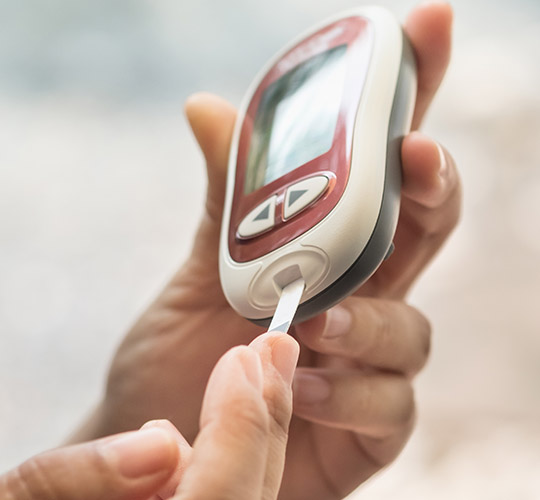Please be advised that the medical practice Lester S. Kritzer, M.D. will be permanently closing its medical practice located at 935 Main Street, Manchester CT on March 25, 2025.
As a result, we will no longer be able to provide patient care.
Important Information Regarding Patient Records
Common Endocrinological Conditions
Thyroid Dysfunction
Thyroid dysfunction is a broad category encompassing a wide range of issues with the function of the thyroid gland. Since the thyroid gland influences pretty much every metabolic process in the body, issues can be as minor as a harmless enlargement to a threatening cancer. The most common thyroid disorders are related to the over- or under-production of thyroid hormone which leads to hypo- or hyperthyroidism. These conditions can be caused by Graves’ disease, toxic adenomas, subacute thyroiditis, or pituitary gland malfunctions, or cancerous growths. Most thyroid dysfunction can be managed well if diagnosed and treated properly.
Thyroid Nodules
Thyroid nodules are lumps on the thyroid gland. Most occur on otherwise healthy thyroid glands and do not cause any adverse symptoms. They are usually found during routine exams. The older you are, the more likely you are to get a thyroid nodule and women are three times more likely than men. A physician will check any nodules with blood tests, ultrasound tests, and fine needle aspiration biopsy. While the vast majority of nodules are benign, rare cases can indicate cancer, which would require advanced treatment.
Weight Control
Since the endocrine system controls many hormones associated with metabolism and fat storage, weight control is commonly managed by endocrinologists. An endocrinologist works with patients to treat secondary causes of obesity along with prescribing diet, exercise, and other lifestyle changes to improve patient health. Some of the medication options include phentermine (Adipex), Victoza, Saxenda, Qsymia, Belviq, and Contrave.
Metabolic Syndrome
Metabolic syndrome is a complicated combination of different conditions including high blood pressure, high blood sugar, excess abdominal fat, and abnormal cholesterol or triglyceride levels. The most obvious external symptom is the excessive weight around the mid-section. Individuals with metabolic syndrome can exceed 400 lbs and BMI of over 50. Risks include cardiovascular disease and type 2 diabetes. The various conditions that constitute metabolic syndrome are usually treated separately.
Osteoporosis
Most people have heard of osteoporosis and associate it with the elderly, especially women. It is a bone disease that occurs once the body has either lost too much bone mass, struggles to produce enough bone mass, or both. This weakens bones and dramatically increases the risk of a break after even a minor fall. There are many causes of osteoporosis, many of which are related to endocrine disorders like diabetes, thyroid dysfunction, and sex hormone imbalance. Treatments often include medication and weight-bearing exercise designed to strengthen bones.
Hypoglycemia
Hypoglycemia, or low blood sugar, is a condition often related to the treatment of diabetes. Common symptoms include irregular heart rhythm, fatigue, shakiness, anxiety, hunger, and irritability. After eating, you body digests and breaks down carbohydrates into different kinds of sugar include glucose, the main source of your energy. If your blood sugar gets too low, your body is starving for fuel and the effects can be deadly. The most common causes are adverse reactions to diabetes medication but other hormonal or glandular problems may also contribute to hypoglycemia.
Polycystic Ovary Syndrome (PCOS)
PCOS is a hormone-based problem experienced by many women between puberty and menopause. Women suffering from PCOS frequently have infrequent or prolonged periods or excessive levels of the male hormone testosterone.The cause of PCOS is unknown, but early diagnosis and treatment, including weight loss, can reduce the risk of complications like type 2 diabetes or heart disease. Some causes may include excess levels of insulin, inflammation, and certain genetic anomalies.
Diabetes Mellitus
More commonly referred to as simply diabetes, this condition is actually a group of metabolic issues that, together, cause high blood sugar over an extended period of time. Essentially, it is a disease that keeps your body from using its blood sugar because the pancreas, part of the endocrine system, produces insufficient insulin or the insulin it makes does notn’t work. Type 1 diabetes which makes up about 10% of people with Diabetes, happens when the Pancreas makes little or no Insulin. The treatment typically requires regular insulin injections or a pump. Type 2 diabetes occurs when you either have too little insulin or the insulin you have does not work properly. Treatment is more varied, including a combination of diet, weight management, exercise, and sometimes medications or insulin injections.
Have a question? Contact us!
These are nowhere an exhaustive list of endocrine and metabolism-related issues but provides a list of some of the most common that we see. The signs, symptoms, and treatment examples are also just a brief summary. If you have any questions about these or other disorders, give us a call. We would be happy to help you understand your body better!



